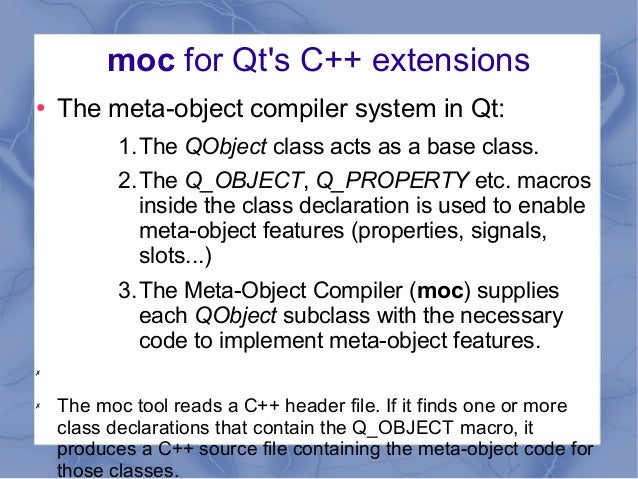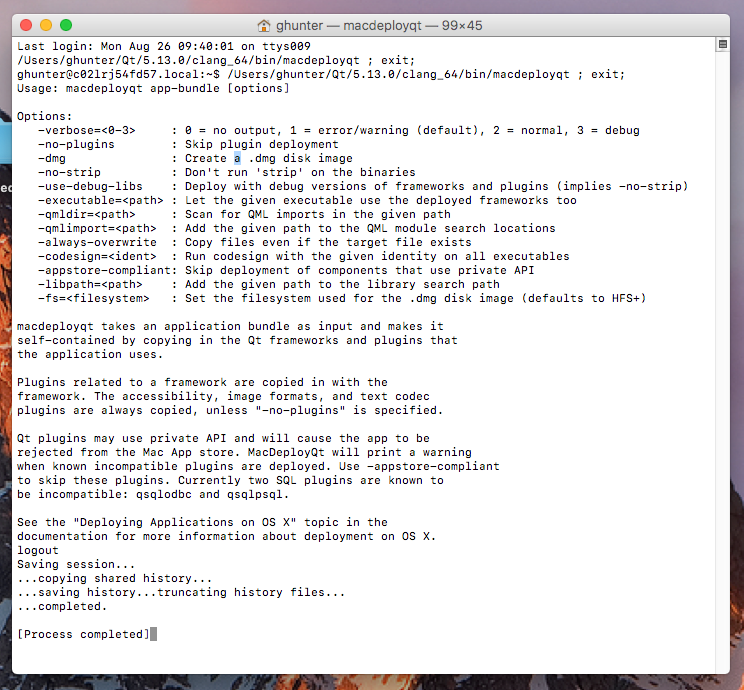Qt New Signal Slot Syntax Overload
EnArBgDeElEsFaFiFrHiHuItJaKnKoMsNlPlPtRuSqThTrUkZh
I personally prefer the staticcast ugliness over the old syntax, simply because the new syntax enables a compile-time check for the existence of the signal/slot where the old syntax would fail at runtime. – Vicky Chijwani Jul 2 '15 at 10:43. The connection mechanism uses a vector indexed by signals. But all the slots waste space in the vector and there are usually more slots than signals in an object. So from Qt 4.6, a new internal signal index which only includes the signal index is used. While developing with Qt, you only need to know about the absolute method index.
This page was used to describe the new signal and slot syntax during its development. The feature is now released with Qt 5.
Nov 08, 2017 Qt/C - Tutorial 073. Signals and slots. Connecting Slots to Overloaded Signals in the Qt5 Syntax. Quite a frequent problem when working with signals with slots in Qt5, according to my observations on the forum, is the connection of slots in the syntax on the pointers to signals. How Qt Signals and Slots Work - Part 2 - Qt5 New Syntax This is the sequel of my previous article explaining the implementation details of the signals and slots. In the Part 1, we have seen the general principle and how it works with the old syntax. @Asimov said in Can someone explain how the new qt5 signals and slots work: I probably only scratched the surface with signals and slots, but I am progressing slowly. Probably not. If you understand the old syntax and understand how pointer-to-member (and/or function pointers) work then you know it all. The new Qt syntax is nothing. The string-based SIGNAL and SLOT syntax will detect type mismatches at runtime. Signals and slots are loosely coupled: A class which emits a signal neither knows nor cares which slots receive the signal. Qt's signals and slots mechanism ensures that if you connect a signal to a slot, the slot will be called with the signal's parameters at the right time. Signals and slots can take any number. Using Qt5 new connect syntax with inheritance. Ask Question Asked 3. Connect to the base member function no the overloaded versions. Is that correct? Is there any way to connect these signals using the new syntax without modifying the architecture? My example is very simplified and modifying that code would require a couple of months (including tests). It works the old way but I would.
- Differences between String-Based and Functor-Based Connections (Official documentation)
- Introduction (Woboq blog)
- Implementation Details (Woboq blog)
Note: This is in addition to the old string-based syntax which remains valid.
- 1Connecting in Qt 5
- 2Disconnecting in Qt 5
- 4Error reporting
- 5Open questions
Connecting in Qt 5
There are several ways to connect a signal in Qt 5.
Old syntax

Qt 5 continues to support the old string-based syntax for connecting signals and slots defined in a QObject or any class that inherits from QObject (including QWidget)
New: connecting to QObject member
Here's Qt 5's new way to connect two QObjects and pass non-string objects:
Pros
- Compile time check of the existence of the signals and slot, of the types, or if the Q_OBJECT is missing.
- Argument can be by typedefs or with different namespace specifier, and it works.
- Possibility to automatically cast the types if there is implicit conversion (e.g. from QString to QVariant)
- It is possible to connect to any member function of QObject, not only slots.
Cons
- More complicated syntax? (you need to specify the type of your object)
- Very complicated syntax in cases of overloads? (see below)
- Default arguments in slot is not supported anymore.
Qt Signal Slot With 2 Arguments

New: connecting to simple function
The new syntax can even connect to functions, not just QObjects:
Pros
- Can be used with std::bind:
- Can be used with C++11 lambda expressions:
Cons
- There is no automatic disconnection when the 'receiver' is destroyed because it's a functor with no QObject. However, since 5.2 there is an overload which adds a 'context object'. When that object is destroyed, the connection is broken (the context is also used for the thread affinity: the lambda will be called in the thread of the event loop of the object used as context).
Disconnecting in Qt 5
Heart of gold clothing. As you might expect, there are some changes in how connections can be terminated in Qt 5, too.
Old way
You can disconnect in the old way (using SIGNAL, SLOT) but only if
- You connected using the old way, or
- If you want to disconnect all the slots from a given signal using wild card character
Symetric to the function pointer one
Only works if you connected with the symmetric call, with function pointers (Or you can also use 0 for wild card)In particular, does not work with static function, functors or lambda functions.
New way using QMetaObject::Connection
Works in all cases, including lambda functions or functors.
Asynchronous made easier
With C++11 it is possible to keep the code inline
Here's a QDialog without re-entering the eventloop, and keeping the code where it belongs:
Another example using QHttpServer : http://pastebin.com/pfbTMqUm
Error reporting
Tested with GCC.
Fortunately, IDEs like Qt Creator simplifies the function naming
Missing Q_OBJECT in class definition
Type mismatch
Open questions
Default arguments in slot
If you have code like this:
The old method allows you to connect that slot to a signal that does not have arguments.But I cannot know with template code if a function has default arguments or not.So this feature is disabled.
There was an implementation that falls back to the old method if there are more arguments in the slot than in the signal.This however is quite inconsistent, since the old method does not perform type-checking or type conversion. It was removed from the patch that has been merged.
Overload
As you might see in the example above, connecting to QAbstractSocket::error is not really beautiful since error has an overload, and taking the address of an overloaded function requires explicit casting, e.g. a connection that previously was made as follows:
cannot be simply converted to:
..because QSpinBox has two signals named valueChanged() with different arguments. Instead, the new code needs to be:
Qt Signal Slot Connect
Unfortunately, using an explicit cast here allows several types of errors to slip past the compiler. Adding a temporary variable assignment preserves these compile-time checks:
Note - If you decided against using the dwarves and are trying to avoid violence all together, you may play three games of Gwent inside the casino. Do not mention Whoreson or be mean in any. This three-story building situated in The Bits district of Novigrad hosts the biggest illegal clandestine casino of the city. Administered by the crime lord Cyprian Wiley, is frequented only by those citizens who can afford the buy-in of 200 crowns and the high-stakes for playing Gwent, namely. For The Witcher 3: Wild Hunt on the PlayStation 4, a GameFAQs message board topic titled 'If I help Cleaver can I get Casino gwent cards?' Aug 22, 2015 Minor Spoilers - Whoreson's Casino Spoilers I did Get Junior before I was interested in Gwent, and obviously lost the opportunity to make a large amount of coin playing the guys in the casino. Mar 18, 2018 While trying to locate the Whoreson Junior in Novigrad Geralt visits his clandestine casino. There after winning some rounds in Gwent he is immediately accused in cheating because Whoreson Junior. 
Some macro could help (with C++11 or typeof extensions). A template based solution was introduced in Qt 5.7: qOverload
The best thing is probably to recommend not to overload signals or slots …
… but we have been adding overloads in past minor releases of Qt because taking the address of a function was not a use case we support. But now this would be impossible without breaking the source compatibility.
Qt Signal Slot Parameter
Disconnect
Should QMetaObject::Connection have a disconnect() function?
The other problem is that there is no automatic disconnection for some object in the closure if we use the syntax that takes a closure.One could add a list of objects in the disconnection, or a new function like QMetaObject::Connection::require
Callbacks
Function such as QHostInfo::lookupHost or QTimer::singleShot or QFileDialog::open take a QObject receiver and char* slot.This does not work for the new method.If one wants to do callback C++ way, one should use std::functionBut we cannot use STL types in our ABI, so a QFunction should be done to copy std::function.In any case, this is irrelevant for QObject connections.